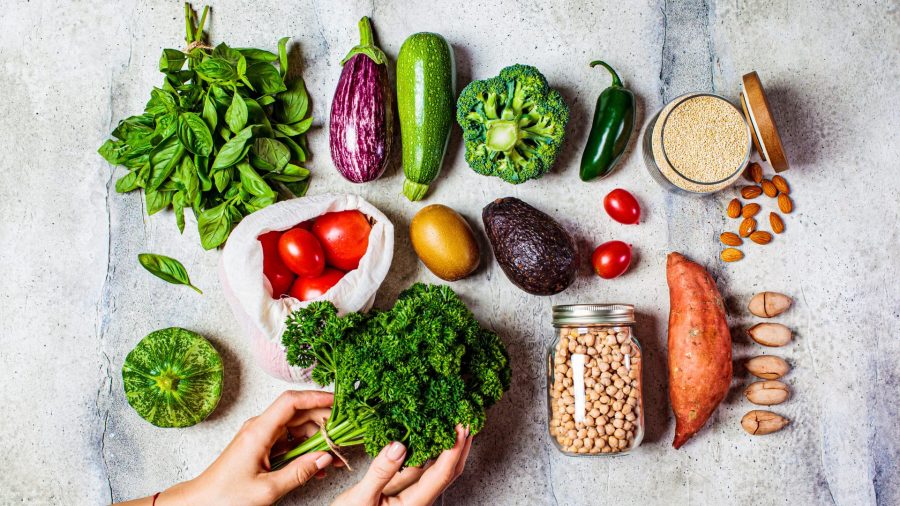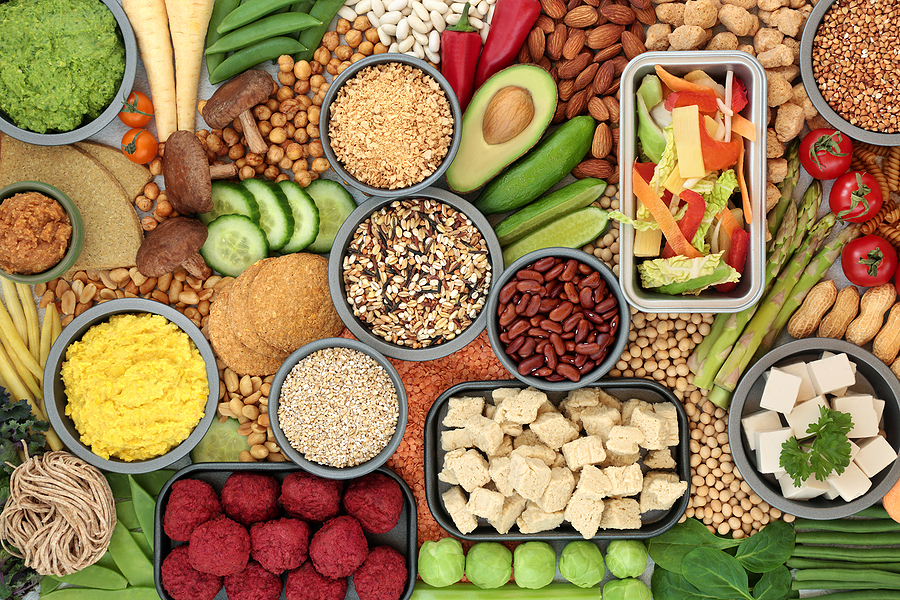All About Healthy And Balanced Food: Advantages of Taking On Plant Based Alternatives
The conversation bordering plant-based diet regimens has actually gained significant interest in the last few years. Many individuals are exploring the potential health and wellness benefits, nutritional benefits, and environmental effects connected with these nutritional choices. As individuals end up being a lot more familiar with their food's influence on well-being and sustainability, inquiries occur regarding the usefulness of embracing such a way of living. What particular modifications can one expect, and exactly how might these selections reshape not only personal health and wellness however likewise the planet's future?
Understanding Plant-Based Diet Plans
Although lots of people associate plant-based diet plans mainly with vegetarianism or veganism, these diets can incorporate a large range of eating patterns that prioritize entire, minimally refined plant foods. Such diet regimens commonly include fruits, veggies, whole grains, seeds, nuts, and vegetables, while removing or restricting pet items. This adaptability allows individuals to customize their nutritional selections according to dietary requirements and individual choices. Some may adopt a mostly plant-based diet regimen while still sometimes consuming meat or dairy products, usually described as a flexitarian approach. The focus remains on integrating even more plant foods, which can cause a diverse range of meals and flavors. Understanding these different interpretations of plant-based consuming is crucial for valuing its ease of access and appeal in modern food society.
Health And Wellness Advantages of Plant-Based Foods
The wellness advantages of plant-based foods are substantial, using a nutrient thickness benefit that sustains general health. Research indicates that these foods can boost heart health and wellness and play a vital duty in effective weight monitoring. By incorporating more plant-based options, people may boost their dietary choices and promote lasting wellness.
Nutrient Density Benefit
Nutrient thickness plays a necessary role in the wellness benefits of plant-based foods, making them an engaging selection for those looking for a balanced diet plan. Plant-based foods, such as fruits, vegetables, legumes, nuts, and entire grains, are commonly abundant in essential vitamins, minerals, and antioxidants while being reduced in calories. This high nutrient density enables people to consume fewer calories while still fulfilling their dietary needs. Additionally, these foods are packed with nutritional fiber, advertising digestion health and assisting in weight monitoring. By including nutrient-dense plant-based options, customers can boost their overall wellness, sustain their body immune systems, and lower the risk of chronic conditions. Inevitably, the nutrient thickness of plant-based foods highlights their value in a health-conscious way of living.
Heart Health Renovation

Weight Administration Support
In enhancement to promoting heart wellness, a plant-based diet can considerably help in weight administration. This nutritional technique emphasizes entire foods such as fruits, veggies, vegetables, nuts, and entire grains, which are typically lower in calories and greater in fiber compared to animal-based products. The high fiber material assists raise satiation, lowering general calorie consumption. Additionally, plant-based diets are commonly abundant in necessary nutrients while reduced in unhealthy fats, making it simpler to keep a healthy weight. Sugar Free Sauces. Study shows that individuals that adopt a plant-based way of life tend to have reduced body mass indexes (BMIs) and experience more successful weight-loss contrasted to those who eat meat-heavy diet regimens. Subsequently, welcoming plant-based options is a tactical choice for efficient weight administration
Nutritional Value of Plant-Based Components
Plant-based components are abundant in essential nutrients, supplying a varied array of vitamins, minerals, and antioxidants that add to total health and wellness. A comparison of healthy protein sources discloses that while pet items are commonly watched as premium, many plant-based alternatives provide adequate protein and various other beneficial substances. Recognizing the dietary value of these active ingredients can aid individuals make educated dietary selections.
Essential Nutrients in Plants
Nutrient-rich ingredients located in plants use a diverse variety of important minerals and vitamins that contribute considerably to overall wellness. These ingredients are abundant in vitamins A, C, and K, which sustain immune feature, vision, and blood clotting, specifically. Furthermore, plants give crucial minerals such as magnesium, potassium, and calcium, important for heart wellness, muscular tissue feature, and bone strength. The presence of fiber in plant-based foods help digestion and promotes a healthy intestine microbiome. Anti-oxidants, found generously in vegetables and fruits, help battle oxidative tension and minimize swelling. In addition, numerous plant foods are low in calories yet high in nutrients, making them a superb selection for those looking for to preserve a healthy and balanced weight while guaranteeing perfect nutrient intake.
Contrasting Healthy Protein Resources
Healthy protein resources vary significantly in their nutritional profiles, with plant-based active ingredients offering one-of-a-kind benefits. Unlike animal proteins, which frequently contain hydrogenated fats and cholesterol, plant healthy proteins have a tendency to be lower in these unhealthy parts. Legumes, nuts, you can try this out seeds, and entire grains are rich in important amino acids, fiber, vitamins, and minerals. For example, lentils give high healthy protein material alongside considerable iron and folate, while quinoa is a full healthy protein, providing all nine crucial amino acids. Additionally, plant-based proteins are often gone along with by anti-oxidants and phytochemicals that support overall wellness. The shift to plant-based healthy protein sources not just improves dietary intake yet likewise aligns with sustainable nutritional methods, reducing ecological impact and promoting lasting health and wellness advantages.
Environmental Influence of Plant-Based Eating
As recognition of climate modification expands, numerous people are exploring sustainable nutritional choices that can considerably lessen their environmental impact. Plant-based eating has become a significant contributor to lowering greenhouse gas emissions, which are mostly related to livestock manufacturing. The farming of fruits, veggies, beans, and grains typically requires fewer sources, such as water and land, contrasted to pet farming. In addition, plant-based diets can result in reduced logging, as much less land is required for grazing animals or expanding animal feed. By moving towards plant-based alternatives, consumers can support biodiversity and advertise healthier ecological communities. In general, welcoming plant-based consuming not only benefits individual health and wellness yet additionally stands for a crucial action toward environmental sustainability and preservation efforts.
Conquering Common Misconceptions
While several people identify the advantages of a plant-based diet, several misconceptions often hinder them from totally accepting this way of living. A typical belief is that plant-based diet plans lack adequate healthy protein; nonetheless, numerous plant resources, such as vegetables, nuts, and tofu, supply enough protein. Furthermore, some assume that this diet is expensive, when actually, staples like beans, rice, and seasonal veggies can be rather affordable. One more false impression is that plant-based eating is overly restrictive, whereas it in fact uses a varied variety of foods and flavors. Numerous stress that a plant-based diet regimen may lead to shortages, yet with appropriate preparation, people can get all needed nutrients, consisting of minerals and vitamins, while appreciating a vast range of scrumptious dishes. Broad Tips for Transitioning to a Plant-Based Way of life
Making the change to a plant-based way of living can be an enhancing experience, though it usually requires some guidance to browse the first modifications. Individuals are encouraged to begin progressively, integrating even more fruits, veggies, legumes, and entire grains right into their meals while decreasing meat and dairy products intake. Meal planning is necessary; preparing a weekly food selection can aid relieve the change and stop last-minute harmful options. Exploring new recipes and cooking approaches can also enhance the experience and keep enjoyment about plant-based consuming. Additionally, joining support teams or neighborhoods can offer motivation and share useful tips. Remaining notified about nutrition assurances balanced dishes, avoiding shortages while cultivating a healthy and balanced, enjoyable plant-based way of living.

Delicious Plant-Based Dish Concepts
Discovering tasty plant-based meal concepts can influence individuals to accept a much more healthy diet plan. One preferred choice is a passionate quinoa salad, featuring cherry tomatoes, cucumber, and a zesty lemon-tahini dressing. An additional fave is a full-flavored lentil stew, packed with carrots, celery, and aromatic herbs, ideal for a comforting dinner. For morning meal, over night oats made with almond milk, chia seeds, and topped with fresh berries offer a nourishing start to the day. Furthermore, a vivid veggie stir-fry with tofu and a selection of vivid veggies can be a quick yet pleasing dish. Velvety avocado toast on whole-grain bread, sprayed with seasonings and seeds, uses a basic yet flavorful snack. These dishes showcase the selection and richness of plant-based eating.

Regularly Asked Questions
Can a Plant-Based Diet Plan Offer Enough Healthy Protein?
The inquiry of whether a plant-based diet plan can offer enough protein is common. Various resources, consisting of beans, nuts, seeds, and entire grains, can meet healthy protein needs efficiently, sustaining a nutritious and well balanced diet plan for individuals.
Are Plant-Based Diet Regimens Ideal for Children?
The viability of plant-based diet plans for youngsters depends on mindful planning. Adequate nutrients need to be ensured, consisting of go right here healthy proteins, minerals, and vitamins. With proper advice, such diet plans can support healthy growth and advancement in kids.
Exactly how Do I Eat in restaurants on a Plant-Based Diet?
Eating out on a plant-based diet regimen includes looking for restaurants with varied food selections, requesting modifications, and discovering vegan-friendly choices. Preparation in advance and interacting nutritional choices can boost the dining experience while keeping nutritional options.
What Prevail Allergens in Plant-Based Foods?
Typical allergens in plant-based foods consist of soy, gluten, nuts, and seeds - Sugar Free Sauces. People complying with a plant-based diet plan must know these allergens and read labels carefully to prevent unfavorable reactions and assure risk-free consumption
Can Plant-Based Diets Aid With Weight Reduction?
Study indicates that taking on a plant-based diet might help with weight-loss as a result of its generally lower calorie density and greater fiber content. This mix can boost satiation, assisting individuals handle their calorie consumption properly. Several people link plant-based diets mostly with vegetarianism or veganism, these diet plans can include a wide variety of consuming patterns that focus on whole, minimally refined plant foods. Nutrient density plays a crucial duty in the wellness benefits of plant-based foods, making them an engaging option for those looking for a balanced diet. Plant-based diet regimens have been shown to noticeably boost heart health, as they typically consist of components pop over here that sustain cardio feature. In enhancement to promoting heart health, a plant-based diet regimen can substantially assist in weight monitoring. An usual belief is that plant-based diet regimens lack sufficient protein; however, numerous plant resources, such as legumes, nuts, and tofu, provide enough protein.